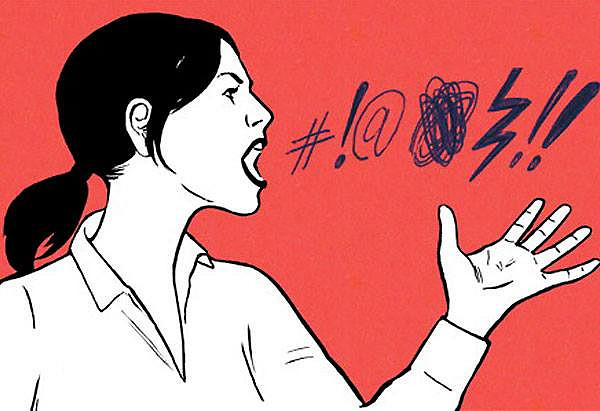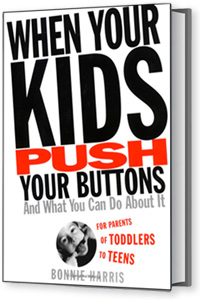Old Beliefs Interfere with Appropriate Discipline
Q. I could never argue my case to my parents and was told not to sass them and be quiet or I wouldn’t get to do what I wanted or I’d have privileges taken away. I don’t like how my parents handled this, but I still ended up believing that if I don’t give consequences/punishments to my child, he will keep misbehaving. I will, however, let him make his case when he’s older.

Our son is 4 yrs. old. We have a rule not to get into daddy’s toolbox in the garage. He was drawn to one particular tool. I’ve explained that the tools are expensive and that he can only use them with an adult. After 3 times getting the same tool, I finally put it up high. A few days ago I was out in the yard and came back to the garage to find he’d gotten out a tube of Ultra Black. It’s VERY gooey, thick, black silicone stuff. It was an ultra PAIN to wash off his hands and feet. We also have a rule to stay in the back yard, which we’ve gone over MANY times—he still goes out of the back yard. (We’re waiting for a new fence to be installed.) Is a natural consequence of going out of the backyard that he can’t play outside any more that day? Do I just talk to him about this rule? Are my expectations too high thinking he will just stay in the back yard? Same for not getting into the toolbox?
A. Why not let your son make his case now? That doesn’t mean you have to agree or do what he wants, but if you listen and hear him, he will feel gotten and will become more cooperative as a result. Then decide what you will do. This is the basis of problem solving: I want X, you want Y. How do we work this out so we can both agree? Choices are also a form of problem solving. No more than 2 choices that are acceptable to you at this age, but he still needs to feel heard, which will set the stage for the long term.
Your expectations may be inappropriate for a 4 y.o. His impulse control is not fully in place. His wants outweigh what he knows he’s not supposed to do when those wants are strong. He will keep after the desired tool even when he knows it’s wrong. Your rule is fine. When he can’t follow the rule (the traditional perception is that he won’t follow it) because his impulses are getting the better of him, putting the tool away yourself is the best solution. Same with the yard. One child might be able to stay within the boundaries, while another is unable because he can’t control his temptations yet. Taking away the privilege of being outside assumes that he is deliberately breaking the rule—the traditional approach. Knowing that he is not able to stay within your bounds yet means staying with him outside until the fence arrives. Expecting him to stay within invisible bounds is unrealistic for him.
The Ultrablack is a perfect example of temperament + development = frustrating behavior for you. Punishment, in this case, is at best ineffective and at worst, damaging. He is a very curious kid, so it’s important to keep toxic or dangerous things well out of reach. It is the traditional assumption that children are being belligerent or defiant when they don’t do what they are told. That thinking keeps us stuck in the punishment mindset. Most parents are not fully educated in child development and temperament to know what rules and expectations are realistic and fair. So we project onto our children what was expected of us and expect them to behave as we did (or not as we did).
Your belief (along with the majority of American parents) that punishment will stop misbehavior comes out of our ignorance of realistic expectations and understanding what behavior is. If they are doing their best yet are still punished (doled out a consequence), that will be the faster road to misbehavior. We set it up. In each of these cases, your son is exploring and experimenting. But when the framework of punishment is predominant, he is misunderstood.
English as a Second Language
Q. My daughter will soon be 7 and is a great kid. We speak Spanish to our kids, but for the past year she has refused to speak Spanish to us. She understands everything we say and always replies but in English. She has never had any issues when I speak Spanish to her in public places until this morning. Just when I was about to drop her off at camp, she said to me: “Mama, please don’t speak Spanish to me in front of the counselors: it is embarrassing.” I explained to her that speaking a different language was a great thing and that I was sure that a lot of people would love to be able to do that. I also told her that we should never be embarrassed about our heritage and who we are and that some of her other friends speak other languages at home and in public. Do you have any advice on how to better handle this situation?
A. Your daughter is not old enough to understand her good fortune to be bilingual. Right now she feels embarrassed because she is trying to fit in and you are announcing (in her mind) that she is different. She wants to make a good impression on her counselors and fears that they will think you are weird and therefore she is weird. Trying to get her to appreciate her heritage and language will be lost on her for quite sometime. Forcing the issue may push her away from listening to you at all.

My advice is to heed her cues, appreciate that she asked you respectfully, and continue the way you speak to her at home. When in public, ask her if it’s ok with her to speak Spanish. Respect her wishes. Do not force her to speak Spanish to you or be disappointed in her when she doesn’t. She may at some point resist you even speaking to her in Spanish at home because of her desire to belong to the culture she lives in. If you resist her and try to get her to understand her fortune, you risk pushing her in the opposite direction as far as appreciating her language and heritage. Your modeling of love for your language and heritage as well as respect for her wishes will be the best teacher, so when she is older and CAN appreciate her heritage, she will because you do. So keep speaking Spanish anytime and everywhere she does not object. But don’t try to rationalize with her about her embarrassment.
Teen Swearing/Directed Swearing
Q. I wonder how to handle swearing/verbal abuse with my 12 and 14 year olds? This question concerns both general swearing and swearing directed at me.
A. General swearing and directed swearing are apples and oranges. Directed at you, swearing is never acceptable. Thus it is important to find out what the provocation is—what your kids are trying to tell you or get from you with the swearing. If they are not getting internal needs of understanding and acceptance met, their behavior will get loud and dramatic in an attempt to get you to see what they need. The problem is most of us don’t know how to read behavior and simply reward or punish the tip of the iceberg.
At a calm time, tell them, “I do not want to be sworn at, and I’m sure you would not be okay with it either. I will be in the other room when you are ready to tell me what you’re angry about.” After emotions are calm, acknowledge their anger and then ask why it is they feel the need to swear at you. Then genuinely listen to their answers. Continue this until they are able to talk about it. Picking your window of opportunity for conversation is critical, so be sure you are not interfering with an important agenda of theirs.

General undirected swearing is hard to curtail especially if you swear, and ESPECIALLY when parenting teens. It is their language of choice. I think it helps to allow it at home instead of forbidding it as long as it doesn’t get excessive and is NEVER directed at anyone—just used as an expletive. Some words are powerful. Kids need to feel powerful. If you forbid swearing they will retaliate or find another power source.
It should be made clear that as powerful as words are, they should never be used abusively. Let them know that swearing needs to stay at home because many people are highly offended by it. List people you know who would be. Ask for their assurance that they can control themselves around those people in order to show respect.
If you are one who is offended by swearing, own your problem with it and ask for their cooperation around you. “Words like that cut me to the core. I would appreciate you keeping them out of my hearing range as well as others who would be offended.” Then if you are sworn at, you know they are punishing you for something. Find out what it is.
To submit a question, email me at bh@bonnieharris.com with your short question and I will answer you within a few days. It may appear in the newsletter at a later date.
 We punish our children in an attempt to keep them from pushing our buttons, often escalating the original problem into a cycle of anger and blame. When Your Kids Push Your Buttons is not about what to do to your kids to get them to stop pushing your buttons. This book is about how to be the parent you wish you could be-the parent that only you are holding yourself back from.
We punish our children in an attempt to keep them from pushing our buttons, often escalating the original problem into a cycle of anger and blame. When Your Kids Push Your Buttons is not about what to do to your kids to get them to stop pushing your buttons. This book is about how to be the parent you wish you could be-the parent that only you are holding yourself back from.







